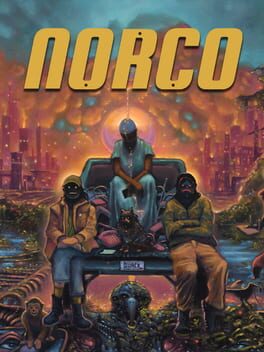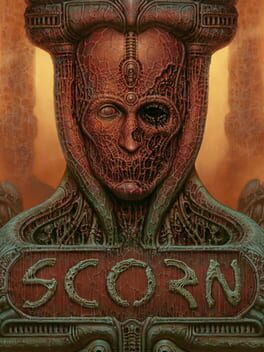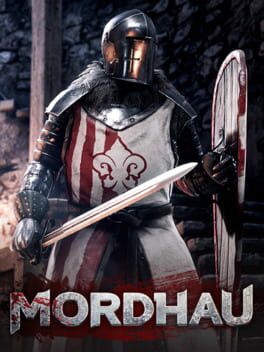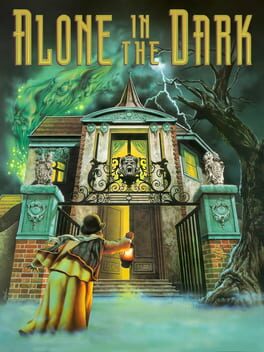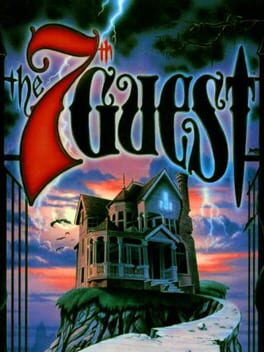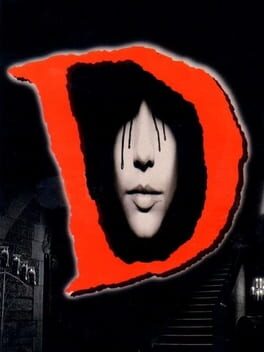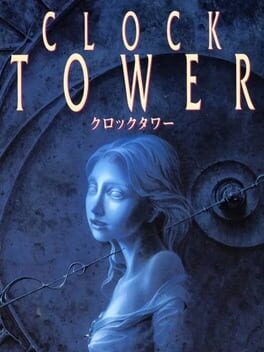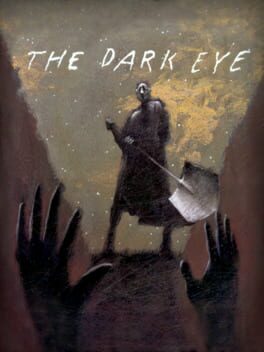BlueCrue
3 reviews liked by BlueCrue
Norco
2022
The comparisons are too easy to make. A narrative driven independent game with lush prose that dabbles in magical realism and science fiction as it confronts visions of both the future and past. It also happens to be set in a version of our world (in this case, the American South) that has been skewed, deals with themes of labor politics and the plight of the working class, and draws on and reinvents design philosophies from decades year old games. The comparisons make themselves. That’s why I am doing my damnedest not to say those games’ names, because to do so robs Norco of its own, distinct identity. It’s torture not to draw line after line between its constituent elements to its counterparts for the sake of preserving that identity, maybe especially because I think Norco is experiencing an identity crisis of its own.
Let me be unequivocal: Norco is a good game. I think it’s worth playing. There’s a part of me that feels bad for offering an emphasis on criticism, as if I’m kicking down a darling indie game. So I’m trying to be particularly explicit here: I think Norco is a good game. It’s filled with beautiful writing, unique characters, and potent themes of grief and politics. It has things to say. But I’m not sure Norco is quite sure what those things exactly are.
I have biases, and two in particular that I arrive at here: I care disproportionately about endings, and I care greatly about “aboutness”. Norco’s ending fell flat for me, and I struggle to know for sure what it’s truly about. These are my biases. As I’ve just said, there are so many reasons to love this game. That’s not what I’m going to write about here. I’m going to write about what keeps me from truly loving Norco.
I think I disproportionately weight endings in narratives because they are what stories leave you with. When you walk out of the theater, the thing that is mostly immediately carried with you is the last frames before the credits rolled. Games, historically, do not have great endings. I don’t mean mechanically; there are lots of games with great final bosses and all that. But the narrative ending, the last moments, these are usually unnoteworthy, and it’s usually brushed off. With narrative driven work, however, this is a little harder to forgive. Of course, everyone likes different kinds of endings. I am picky with my endings, I’ll admit, but I try to have a nuanced understanding of what does and doesn’t work with me in an ending. Enter Norco.
Norco’s ending, by which I mean the exact final moments before the credits roll, feel rushed and incomplete. It is in desperate need of a denouement. It’s ironic, because the climax of this game is flanked, quite literally, with two beautiful moments on the left on the right, one of which is perhaps the game’s most beautiful sequence. I will not spoil it, but it is an ethereal, melancholy, and haunting image of memories and home. I almost wish moment was positioned as the Norco’s last moments, because this potency is immediately undercut by the climax, which felt bereft of catharsis. And I think the reason this climax fell so flat for me is because it relied on the motives of the main character, whose identity and desires are opaque and indistinct.
Kay, the protagonist, never feels like she is given the opportunity to become a character of her own. Blake, her brother, almost feels like one, but is mostly off screen. The companions you encounter feel like characters. They have motives, interiority, likes and dislikes, quirks. Catherine, Kay’s deceased mother, who you play as in flashbacks, gets to be a character, too. This is welcome; rather than just being a grief object for the protagonist, Catherine gets to be a person. So rarely are stories about grief as much centered on who we lose as how we lose them. But what about Kay? What are Kay’s feelings? What does Kay want, need? What does she like or dislike? I’m not sure I could tell you anything about her, despite having spent hours in her shoes. I felt more empathetic and understanding of its side characters by the end. All I know about Kay for sure is that she is detached.
A detached character is obviously not a bad thing, and detachment serves an important role here. Kay’s detachment, as I read it, is representative of a response to what feels to many young people like the slow march into a catastrophe by modern industrial society. It is very intentional, and the rare moments where Kay’s detachment is overtly characterized, it is felt strongly. But when a game builds up to a climax which centers on the characters goals, motives, and desires, her own specific relations and history, all of which are deliberately muted and blurred… I struggle to be moved by that climax and its ever brief ending.
Kay is neither a cipher nor a character you roleplay as. I don’t know what she’s supposed to be. She’s not me, but who is she? I can neither imagine myself as her or imagine her as someone else. Like the game itself, the player is in a crisis of identity.
Norco is kind of a mess, both narratively and mechanically. It’s modeled after classic adventure games, but the puzzle design is a far cry from that old school style -- which is not something I’m exactly mourning. Those puzzles were notoriously arcane and absurd, an ethos that has aged in quite a way, and it wouldn’t have worked here. Norco’s puzzles are relatively straight forward and signposted heavily, and you can ask for advice. But Norco also has a combat system. And it has mini-games. A lot of them. Most of these mini-game puzzles are fine. Nothing exceptional, but nothing horrible. There is one bit I did think was excellent and well executed, which I won’t get into again for spoilers, but involves a boat. But I truly have no idea why this game has combat. It’s not fun and just feels silly. And this lack of cohesion is also seen in its thematic underpinnings.
The themes are easy enough to identify: the struggles of the working class, religion’s social role, messianic myth, the desire to find meaning under late capitalism, ironic middle class hipsterism, the ever-extravagant machinations of the bourgeoisie, and so on. But these themes are neither explored on their own fronts nor are they unified by any central theme. The “Mind Map”, which is an interior display of the lore and relationships in Kay’s life (again, trying not to make the comparison here) is dense with connections but not with cohesion. There is some fascinating world-building and cool ideas in here. But where do they lead to?
Obviously I don’t think it’s necessary that a “message” be had in art, but when you neither pose questions nor offer answers, it can begin to feel more like these themes are props. Norco mostly acknowledges and maybe comments on its phenomena. Again, that’s not intrinsically bad, but I have my preferences, and the absence of direction doesn’t work for me here. All of it is cool, sure. But I don’t know what to make of it, and not in a way that fills me with giddy curiosity. I didn’t leave Norco with any questions, for either its world or for my own.
Again, I feel guilt, “damning with faint praise”, but I seem to be in the minority here, which is nice, I guess. It makes me feel a little more comfortable offering criticism. After all, I can find plenty of ecstatic analyses of Norco, but not as much where I’m coming from. I see why others have fallen in love with it. But I never got that far. Maybe I’ll grow more fond after reading criticism and other’s feelings. But this was my initial response, and that counts for something.
Norco, at its core, ends up as a collage, so scattered as to almost resemble a pastiche of itself. It’s soup full of scoopfuls of ideas that have been lightly emulsified. Collages can be good. And Norco is good. Its lack of thematic and structural direction does not nullify all the beauty therein, but it is why I don’t think I’ll ever get goosebumps when I think about it.
Let me be unequivocal: Norco is a good game. I think it’s worth playing. There’s a part of me that feels bad for offering an emphasis on criticism, as if I’m kicking down a darling indie game. So I’m trying to be particularly explicit here: I think Norco is a good game. It’s filled with beautiful writing, unique characters, and potent themes of grief and politics. It has things to say. But I’m not sure Norco is quite sure what those things exactly are.
I have biases, and two in particular that I arrive at here: I care disproportionately about endings, and I care greatly about “aboutness”. Norco’s ending fell flat for me, and I struggle to know for sure what it’s truly about. These are my biases. As I’ve just said, there are so many reasons to love this game. That’s not what I’m going to write about here. I’m going to write about what keeps me from truly loving Norco.
I think I disproportionately weight endings in narratives because they are what stories leave you with. When you walk out of the theater, the thing that is mostly immediately carried with you is the last frames before the credits rolled. Games, historically, do not have great endings. I don’t mean mechanically; there are lots of games with great final bosses and all that. But the narrative ending, the last moments, these are usually unnoteworthy, and it’s usually brushed off. With narrative driven work, however, this is a little harder to forgive. Of course, everyone likes different kinds of endings. I am picky with my endings, I’ll admit, but I try to have a nuanced understanding of what does and doesn’t work with me in an ending. Enter Norco.
Norco’s ending, by which I mean the exact final moments before the credits roll, feel rushed and incomplete. It is in desperate need of a denouement. It’s ironic, because the climax of this game is flanked, quite literally, with two beautiful moments on the left on the right, one of which is perhaps the game’s most beautiful sequence. I will not spoil it, but it is an ethereal, melancholy, and haunting image of memories and home. I almost wish moment was positioned as the Norco’s last moments, because this potency is immediately undercut by the climax, which felt bereft of catharsis. And I think the reason this climax fell so flat for me is because it relied on the motives of the main character, whose identity and desires are opaque and indistinct.
Kay, the protagonist, never feels like she is given the opportunity to become a character of her own. Blake, her brother, almost feels like one, but is mostly off screen. The companions you encounter feel like characters. They have motives, interiority, likes and dislikes, quirks. Catherine, Kay’s deceased mother, who you play as in flashbacks, gets to be a character, too. This is welcome; rather than just being a grief object for the protagonist, Catherine gets to be a person. So rarely are stories about grief as much centered on who we lose as how we lose them. But what about Kay? What are Kay’s feelings? What does Kay want, need? What does she like or dislike? I’m not sure I could tell you anything about her, despite having spent hours in her shoes. I felt more empathetic and understanding of its side characters by the end. All I know about Kay for sure is that she is detached.
A detached character is obviously not a bad thing, and detachment serves an important role here. Kay’s detachment, as I read it, is representative of a response to what feels to many young people like the slow march into a catastrophe by modern industrial society. It is very intentional, and the rare moments where Kay’s detachment is overtly characterized, it is felt strongly. But when a game builds up to a climax which centers on the characters goals, motives, and desires, her own specific relations and history, all of which are deliberately muted and blurred… I struggle to be moved by that climax and its ever brief ending.
Kay is neither a cipher nor a character you roleplay as. I don’t know what she’s supposed to be. She’s not me, but who is she? I can neither imagine myself as her or imagine her as someone else. Like the game itself, the player is in a crisis of identity.
Norco is kind of a mess, both narratively and mechanically. It’s modeled after classic adventure games, but the puzzle design is a far cry from that old school style -- which is not something I’m exactly mourning. Those puzzles were notoriously arcane and absurd, an ethos that has aged in quite a way, and it wouldn’t have worked here. Norco’s puzzles are relatively straight forward and signposted heavily, and you can ask for advice. But Norco also has a combat system. And it has mini-games. A lot of them. Most of these mini-game puzzles are fine. Nothing exceptional, but nothing horrible. There is one bit I did think was excellent and well executed, which I won’t get into again for spoilers, but involves a boat. But I truly have no idea why this game has combat. It’s not fun and just feels silly. And this lack of cohesion is also seen in its thematic underpinnings.
The themes are easy enough to identify: the struggles of the working class, religion’s social role, messianic myth, the desire to find meaning under late capitalism, ironic middle class hipsterism, the ever-extravagant machinations of the bourgeoisie, and so on. But these themes are neither explored on their own fronts nor are they unified by any central theme. The “Mind Map”, which is an interior display of the lore and relationships in Kay’s life (again, trying not to make the comparison here) is dense with connections but not with cohesion. There is some fascinating world-building and cool ideas in here. But where do they lead to?
Obviously I don’t think it’s necessary that a “message” be had in art, but when you neither pose questions nor offer answers, it can begin to feel more like these themes are props. Norco mostly acknowledges and maybe comments on its phenomena. Again, that’s not intrinsically bad, but I have my preferences, and the absence of direction doesn’t work for me here. All of it is cool, sure. But I don’t know what to make of it, and not in a way that fills me with giddy curiosity. I didn’t leave Norco with any questions, for either its world or for my own.
Again, I feel guilt, “damning with faint praise”, but I seem to be in the minority here, which is nice, I guess. It makes me feel a little more comfortable offering criticism. After all, I can find plenty of ecstatic analyses of Norco, but not as much where I’m coming from. I see why others have fallen in love with it. But I never got that far. Maybe I’ll grow more fond after reading criticism and other’s feelings. But this was my initial response, and that counts for something.
Norco, at its core, ends up as a collage, so scattered as to almost resemble a pastiche of itself. It’s soup full of scoopfuls of ideas that have been lightly emulsified. Collages can be good. And Norco is good. Its lack of thematic and structural direction does not nullify all the beauty therein, but it is why I don’t think I’ll ever get goosebumps when I think about it.
Scorn
2022
I... I don't even know where to begin. I guess I can start by saying that every complaint about how bullshit or obtuse the puzzles are is a MAJOR self-report that you got held back in elementary school. If puzzle games just aren't your thing that's fine, but God forbid a game actually makes you figure stuff out for once. If you think these puzzles are obtuse YOU AINT SEEN OBTUSE PUZZLES. Your average old school point and click is significantly more obtuse than this. Yes, Scorn doesn't give you notifications, jingles, or XP increases to signify when you're doing the right thing, but that would be fucking stupid if it did. To me, being thrown into the deep end with no form of guidance is a major factor in what makes the game so enjoyable. This is a truly rotten, desolate, hostile, hellscape of a world, and having to experience it from the POV of a nameless lost soul fits perfectly. Neither you nor the protagonist truly knows what you're doing or why you're doing it; you just know that you need to keep going. This is where the gameplay and world design are at their most harmonious. The atmosphere is almost suffocatingly bleak, and it feels like every function of the world is just a cycle of cruelty, death, and rebirth. It's a fairly gruesome game, and the H.R. Giger inspired world design is both hauntingly beautiful and utterly repulsive in all the best ways. It makes for a truly unique experience that was engaging from start to finish. I'm still unsure how I feel about the ending, but the journey was certainly a memorable one nonetheless. For those aspects alone, the game is probably worth checking out for many people.
Unfortunately Scorn isn't always smooth sailing, and as many others have pointed out, this game has some less than stellar combat. Now truthfully I don't despise the combat (and I actually think it works well in some aspects) but its not great. It is a survival horror game, so going guns blazing is definitely not the right way to approach this and the game actually presents a few clever ways to skirt around some of the combat encounters. But you can't avoid everything so at one point or the other you'll be forced to fight head on and it's... jank. It's definitely not the worst survival horror combat I've seen (looking at you Sinking City) but it ain't Resident Evil either. For the most part, I think the game gets around combat fairly well, with the more exploration heavy sections usually having ways to avoid it. The scenarios that are built around unavoidable direct combat however, just end up feeling rough and occasionally frustrating, as one late game encounter in particular drags on forever. Though I will admit, part of me thinks that maybe that's the point. Maybe it's fitting that a world so oppressive would have combat that really puts you at a disadvantage and makes it a struggle. However I do think there is a distinct difference between making combat you dread because its challenging/has consequences and making combat you dread because its just simply annoying and not very fun, and unfortunately I think Scorn may tip the scale in the latter direction.
The game also has its fair share of general roughness with a few bugs that pop up here and there. It's mainly just small glitches in the audio and visual departments but I did have one bug where an interaction stopped working and I had to reload the game. No progress was ever lost though, so everything was pretty minor.
I have many other conflicting thoughts about this game that I'm having trouble putting into words, so I walk away a bit unsure of how to rate the game. Regardless of that, Im still very happy this finally got released and that I was able to experience it. If you have gamepass, I think it's 100% worth giving this a shot. Even if it doesn't end up being your thing, there's enough cool shit in here that warrants at least giving it a look.
Unfortunately Scorn isn't always smooth sailing, and as many others have pointed out, this game has some less than stellar combat. Now truthfully I don't despise the combat (and I actually think it works well in some aspects) but its not great. It is a survival horror game, so going guns blazing is definitely not the right way to approach this and the game actually presents a few clever ways to skirt around some of the combat encounters. But you can't avoid everything so at one point or the other you'll be forced to fight head on and it's... jank. It's definitely not the worst survival horror combat I've seen (looking at you Sinking City) but it ain't Resident Evil either. For the most part, I think the game gets around combat fairly well, with the more exploration heavy sections usually having ways to avoid it. The scenarios that are built around unavoidable direct combat however, just end up feeling rough and occasionally frustrating, as one late game encounter in particular drags on forever. Though I will admit, part of me thinks that maybe that's the point. Maybe it's fitting that a world so oppressive would have combat that really puts you at a disadvantage and makes it a struggle. However I do think there is a distinct difference between making combat you dread because its challenging/has consequences and making combat you dread because its just simply annoying and not very fun, and unfortunately I think Scorn may tip the scale in the latter direction.
The game also has its fair share of general roughness with a few bugs that pop up here and there. It's mainly just small glitches in the audio and visual departments but I did have one bug where an interaction stopped working and I had to reload the game. No progress was ever lost though, so everything was pretty minor.
I have many other conflicting thoughts about this game that I'm having trouble putting into words, so I walk away a bit unsure of how to rate the game. Regardless of that, Im still very happy this finally got released and that I was able to experience it. If you have gamepass, I think it's 100% worth giving this a shot. Even if it doesn't end up being your thing, there's enough cool shit in here that warrants at least giving it a look.
